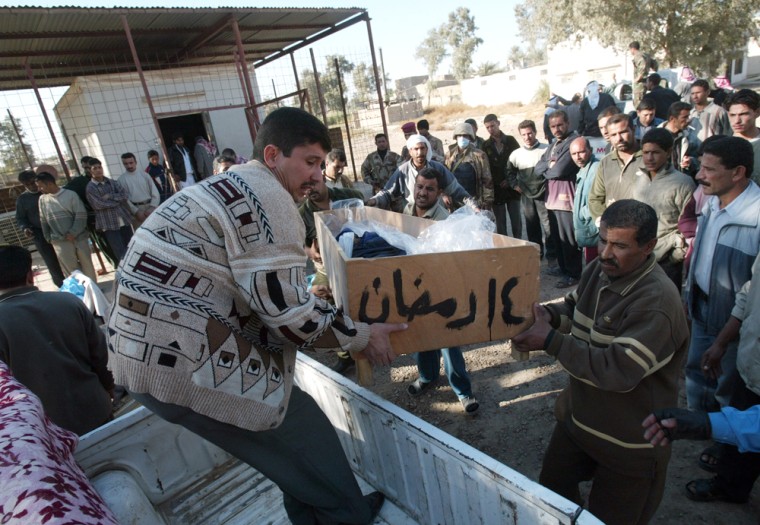A day after 30 people died in a suicide bombing here, the preacher at a major Sunni Arab mosque Friday condemned the horrific attack and called for unity between Iraq’s rival Muslim communities.
Still, resentment of the country’s Shiite political parties runs high in this troubled town 20 miles south of Baghdad — along with anti-American sentiment.
“The targeting of innocent civilians yesterday cannot be accepted,” sheik Murad al-Oujaili told the congregation at the 14th of Ramadan mosque, relating how a witness told him of an infant ripped from his mother’s arm and hurled to his death by the force of the blast.
In the attack, a suicide bomber detonated his vehicle at the entrance to a hospital compound as American soldiers were there inspecting the facility and handing out candy to children. Four U.S. soldiers were slightly wounded. The dead included three women and two children.
The bombing appeared part of the pattern of violence, including reprisal attacks between Sunnis and Shiites, which has given this once quiet farming area just south of Baghdad the nickname “Triangle of Death.”
‘We are all Iraqis’
“This thing about Shiites and Sunnis is new to us in Iraq,” the sheik told the worshippers, most of them bearded, robed men in their 20s and 30s. “We are all Iraqis and we must stop blaming each other.”
His message suggests that many Sunni Arabs, the disaffected minority that forms the backbone of the insurgency, may be growing weary of the increasingly sectarian character of the violence.
Banners condemning the suicide bombing appeared Friday in the main outdoor market, and residents say many people now routinely report suspicious individuals, cars and other objects to security forces.
“These attacks are genocide against the Iraqi people. They have nothing to do with resistance,” said Abdel-Ilah Nijm, a 28-year-old house painter.
The Mahmoudiya area is home to some 300,000 people, slightly more than half of them Sunni Arabs and the rest Shiites. Early last year, insurgents in the area began targeting Shiite residents as well as pilgrims and politicians traveling to Shiite shrine cities to the south.
Violence, deprivation
Many Shiites have fled the area to escape threats and intimidation by Sunni militants. Scores of people from both sects have been slain over the past year in apparent reprisal killings.
Apart from the violence, residents struggle with economic hardship — due in large part to the chronic fuel and electricity shortages that have made it difficult to run irrigation pumps in an area dependent on farming for its livelihood.
Residents say they will take part in the Dec. 15 national parliamentary election, and posters advertising the different political movements appear on the town’s walls. U.S. officials hope the election will produce a parliament with greater Sunni representation to encourage the minority community to turn its back on the insurgency.
The Sunni boycott of the January elections gave power to majority Shiites and Kurds.
Fears of more tension
But some in Mahmoudiya fear the election could inflame sectarian tensions and suppress the voices of reconciliation.
Ibrahim Jassim Mohammed, an official of the Shiite movement led by radical cleric Muqtada al-Sadr, said their campaign workers operate under cover of darkness when plastering posters on walls and visiting voters in their homes.
“I think it will be good for Iraq and for everyone to take part in the December election,” sheik al-Oujaili told The Associated Press after the Friday prayers. “But it’s a choice that each one of us must make.”
The new interest in politics, however, has not been matched by a change of heart about the United States. Iraqis here and elsewhere blame the Americans for the country’s problems including Shiite-Sunni tensions, fuel shortages and power outages.
“I still remember my fifth grade lesson about the colonialist policy of divide and rule,” al-Oujaili said in his sermon, suggesting that the Americans want to push Iraq’s Sunnis and Shiites apart.
Hatred of Americans endures
Aref Taha, a father of four who said his wife was shot dead a year ago by U.S. soldiers in unexplained circumstances, mused about the forthcoming elections, the loss of his Shiite farm hands through intimidation by Sunni militants and how he and his children cope with a life of shortages, danger and personal loss.
“These Shiite political parties, they are all Iranians,” he said, echoing an often repeated charge by Sunni Arabs that Shiite parties are too close to the Iranians. “The constitution they gave us will break up Iraq.”
His eldest son Zaid, 15, bears scars from the shooting in which his mother died and bitterness for the soldiers he blames for her death.
“I hated the Americans from the day they arrived in Iraq,” he said. “Now my hatred for them is intense.”
